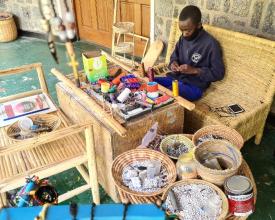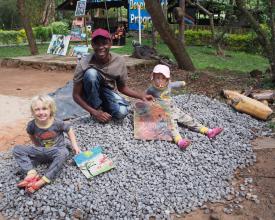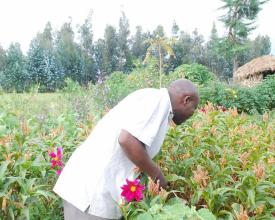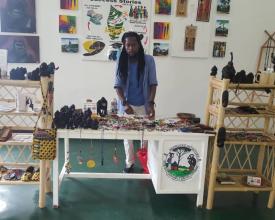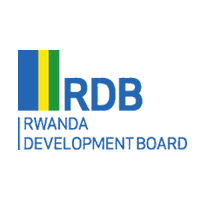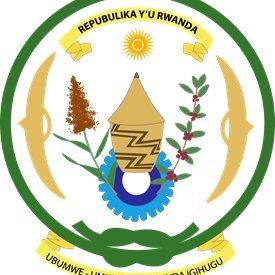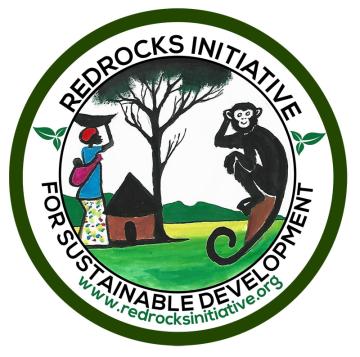
Community-based tourism's contribution towards conservation in Rwanda's Volcanoes National Park
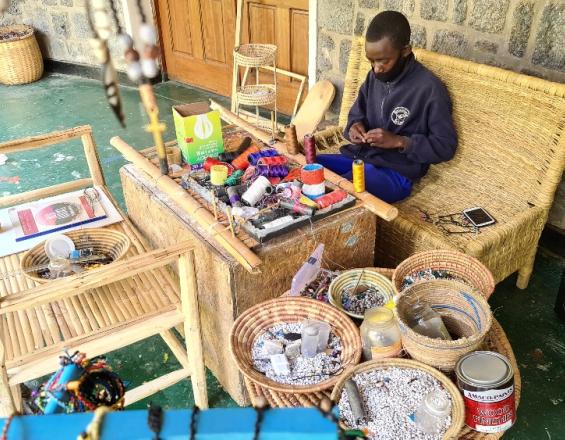
Rwanda’s Volcanoes National Park (VNP) is sited in the Virunga Mountains, one of the most important regions for biodiversity conservation in Africa. We introduced community-based tourism entrepreneurship working with communities around the village of Nyakinama. We work closely with women and youth cooperatives, integrating their views and wishes through participatory planning meetings. We facilitate the access to market, enabling cooperatives to reach international tourists with their handicraft products and cultural activities. Environmental programmes, linked to tourism products have positive impacts on biodiversity.
Our community-based tourism activities support conservation in VNP. Our model helped in diversifying livelihoods and reduced forest resources dependency. Our community-based tourism programme has a high pro-poor impact, enabling the local community to be included in the tourism value chain, increase their economic status, thus allowing them to spearhead conservation in the Volcanoes National Park.
Context
Challenges addressed
- High human population densities surrounding the park which reach as high as 1000 inhabitants per km2 in some areas.
- Food insecurity is a driver of dependency on forest resources, with poor households supplementing their subsistence livelihoods by harvesting water, bushmeat, medicinal plants, bamboo and fuel wood from the park.
- Wild honey gathering in the forest has also caused devastating accidental forest fires.
- Land is the primary economic asset and 90% of rural people in the region rely on subsistence farming with very few off-farm activities.
- Population growth due to the region's high fertility and the struggle for available resources and land are driving encroachment on the park’s edge.
Location
Process
Summary of the process
Our approach to community engagement in VNP is distinctly bottom-up in nature. Much of the community development activities around VNP are infrastructure investments that create indirect benefits to the community. Indirect benefits are typically linked to conservation and do not prioritise the needs of those closest to the park. We established community cooperatives to run the cultural activities, provide a venue for marketing the activities as a product to tourists. Collectively, we work with over 300 vulnerable women across 5 cooperatives in an area of high rural poverty around the village of Nyakinama, 8km south of Musanze. Most of the women lacked formal education, majority being widows or single parents. Thanks to the initiative of baskets weaving that are sold to the tourists, those vulnerable women can earn a living.
Building Blocks
Rwanda Tourism Revenue Sharing (TRS) program
The Tourism Revenue Sharing (TRS) program was introduced by the Rwanda Development Board with the aim to share a percentage of the total tourism park revenues with the communities living around.
The TRS is one of the most progressive and successful community programmes. The goal of revenue sharing is to reduce illegal activities in the park and improve the living conditions of the communities by providing alternatives to park resources and compensation to farmers for the loss of productivity due to wildlife crop raiding. Between 2005 and 2010, $536,665 went to community projects through the revenue sharing programme. In May 2017, revenue sharing was increased from 5% to 10% of gross tourism revenues earned by our Rwanda Development board.
The main focus of spending has been on infrastructure such as schools, water tanks, health centres and sanitation.
Red Rocks Initiative took the opportunity of the TSR funding to establish Community cooperatives. We embarked on intensive training and skilling on making a lot of art and handicraft products, depicting rich diverse Rwanda Culture, Agro-business, Youth Talent. At the end, even those who used to poach understand the benefits of tourism.
Enabling factors
We focused on the assets, skills and resources that are within the community’s control, and how new tourism activities will fit into the mix. Coffee farms have become tourism products themselves, catering for tourists taking part in agricultural experiences and providing additional income. We also complimented existing livelihood strategies with tourism to allow communities to retain our local traditions. This way, they feel empowered by improving their well-being and involving in cultural tourism activities.
Lesson learned
The local community learned the benefit of preserving the park since they earned from the tourism business which was flourishing in Rwanda. Ever since the infrastructures were developed, the local community felt the urge to make sure that the park and the animals within the park are largely protected.
Community partnership programme
The main threats to the park emanate from the combination of a lack of a true buffer zone and widespread poverty surrounding the park. VNP’s Community Partnership Programme has therefore identified priorities as mitigating crop damage caused by wild animals and establishing new livelihoods for communities. 862 community members organized in cooperatives are involved in park conservation activities and tourism. 262 porters benefit as temporary staff, who earn between $12 to $25 per day to carry visitors' belongings during gorilla viewing and hiking.
As a means of reducing forest resources dependence, we have provided alternative income generating activities, through the establishment of fuel wood plantations and fuel efficient stove adoption, support for developing bamboo propagation and processing outside the park, and support for rainwater harvesting systems. We also developed alternative agriculture options such as identifying crops that are economically viable but not targeted by wildlife crop-raiding.
In 2007, a 1-meter-high stone buffalo wall was completed that spans the entire 76km border of VNPto reduce crop damage by wild animals by Rwanda Development board. We encourage the local community to constantly maintain it.
Enabling factors
One of the factors which enabled us is to connect with local communities and train them on different tourism jobs available like being porters, community guides and involve them in the cooperative ownership meaning that we involve them in decision making for all the issues affecting the cooperatives and ensure they create partnerships with other locals whom wish to be part of the programs and teaching them new marketing strategies for new cultural tourism products we develop.
Lesson learned
Locals became aware of the different aspects of learning new technologies which we train them on conservation and they become decisive on any issue concerning the administration of the cooperatives and they learn on how to develop any new cultural tourism product we develop.
Impacts
We promote environmental sustainability and inclusively through projects that are culturally appropriate.
- More than 100 women participate in our tree planting activities
- Created jobs and opportunities for 120 artisans and craftspeople, performers and entertainers, lodgings, dining establishments, crafts supply stores; trained more than 35 youth to work in our campsite as local guides; and supported 25 local artists to engage in producing artistic materials speaking about the urge to conserve the environment.
- Established local traditional dancing troop composed of 25 women and 5 men who do the drumming for the tourists.
- We involved more than 200 women to work in making eco-friendly banana seed bags, to replace plastic bags, which also contribute to soil conservation.
- The Establishment of Red Rocks botanical garden prevented the locals from entering the park in search of medicinal plants
- Beekeeping activity which is promoted outside the park provides income to the locals by selling natural honey to the tourists and nearby lodges/hotels thus gaining some income
Beneficiaries
- Single mothers
- Local artisans (40)
- Youth
- Vulnerable families (90)
Sustainable Development Goals
Story
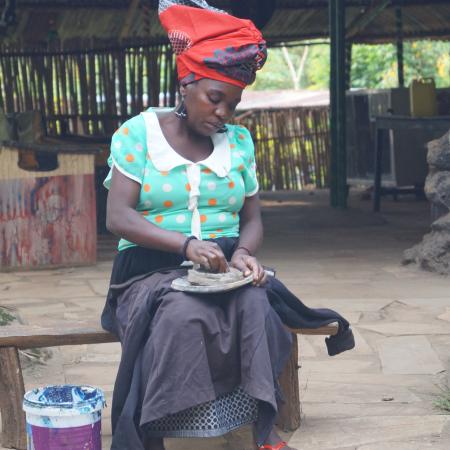
We committed to working in partnership with local people, environmental protection and sustainable development. Our mission statement is to support training, capacity building, environmental protection, nature conservation, and promotion of good practice and the preservation of cultural heritage; describing us as to work with the poor and oppressed to promote human transformation and social justice and development that is community-based and sustainable, focused especially on the needs of the vulnerable.
Marie Louise joined Red Rocks 10 years ago, she is skilled in showcasing how pottery-making is made, once with us she learned how to drum and joined the local cultural dancing troop. She is a single mother of 4 children, her husband died during the atrocities which befallen our country in 1994. She used to be accommodated by well-wishers and supported by social organisation to educate and cater for children but from the income she got from the cultural activities offered at our red rocks, she managed to build her own house and currently she is able to pay for medical insurance for her kids and also manages to pay for the school fees and other needs for her family. It is in this regards that she quoted that Red Rocks has helped her by bringing her together with other single mothers with whom she made friends and shared their experiences on how to engage in tourism activities thus making them connect with foreigners. We gave them an area where they will be selling their products. Initially, she joined Red Rocks when we only had 1 cooperative but now the number has grown and they are happy to share skills and income generated.
